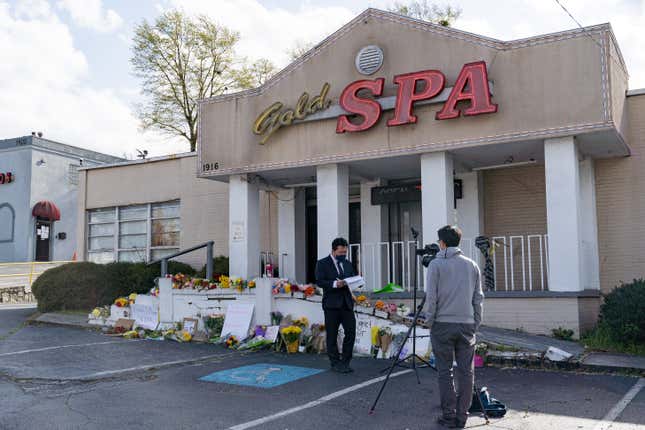Anti-Sex Work Group Takes Down Pages Stoking Panic About Massage Parlors
Latest

Polaris, a national anti-trafficking group known for its staunch opposition to sex work, has reportedly removed multiple pages from its website related to massage parlors in the wake of last week’s Atlanta shootings.
As Motherboard reported, the alterations to the site were first noticed by Justin Case and cam model Mary Moody, who shared a screenshot of a deleted page archived by the Wayback Machine titled “Human Trafficking in Illicit Massage Businesses.” At the bottom of the page there are links out to other massage parlor-related content on the site, including pages titled “Massage parlor trafficking is big business, “Improving law enforcement response to massage parlor trafficking,” and “Your role in ending massage parlor trafficking.”
This latter title has a particular resonance with the Atlanta shooter’s statement that he killed his eight victims because they represented a “temptation he wanted to eliminate.” In an email to Motherboard, a Polaris spokesperson said the pages were taken down “in an abundance of caution on the off chance some white supremacist extremist might find a way to twist it into an excuse for violence.” The spokesperson maintained that the group takes a “more holistic approach” to its anti-trafficking mission and does not place a special “focus on the massage parlor in particular “(although it may wind up as part of the strategy in localities where it is particularly prevalent).”
Nonetheless, much of the organization’s massage parlor-related content still remains live on the site: A search for “massage parlors” on Polaris’s site turns up a 2018 blog titled “Human Trafficking in Massage Parlors: A Deeply Manipulated Sense of ‘Choice,’” another titled “Is Your Local News Protecting Massage Parlor Trafficking Victims?” and several other press releases and “resources” fear-mongering about the businesses. Some of these posts encourage readers to contact their representatives to demand more oversight of massage parlors and write to local newspapers to urge editors and reporters to investigate trafficking in their communities.
This content represents just a fraction of the work Polaris does to spread misinformation about massage parlors and encourage law enforcement to crackdown on the businesses, despite a long history of these crackdowns primarily resulting in harm to sex workers. But Polaris makes few distinctions between people who are being trafficked and sex workers: The group has been a vocal opponent to efforts to decriminalize sex work, even though sex workers rights advocates say that doing so would both make sex workers safer and protect trafficking victims.
Despite the group’s clear anti-sex work bent, its claims have been widely circulated in the last week by mainstream outlets like the New York Times and USA Today. One Times article about the Atlanta shootings leaned on dubious statistics from Polaris for context about massage parlors, and at least three different USA Today stories either cited a Polaris study or quoted the group’s CEO.
Other anti-trafficking groups are also using the recent attacks to advance the narrative that massage parlors are solely sites of abuse and exploitation. On Thursday, the Coalition Against Trafficking in Women released a statement calling on Atlanta law enforcement to investigate “possible connections to sex trafficking” at the parlors where the shootings took place. These groups argue that the violence stems from the very idea that someone is trading sex for money; sex workers and their allies know that in reality, much of it comes from anti-sex work laws, the authorities that enforce them, and groups like these, which only stoke fear, stigma, and misunderstanding.
“Society knows how to fix the problem, but they continue to harm the community because of their moral agenda, their racist ideas,” said Elene Lam, the executive director of Butterfly, a Toronto-based group for Asian and migrant sex workers, during a vigil for the Asian massage workers who were killed on Tuesday. “People are killed by sexism, racism, whorephobia, by the state, and by NGOs that claim to rescue sex workers.”